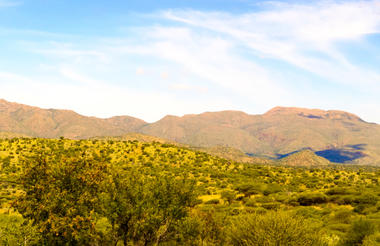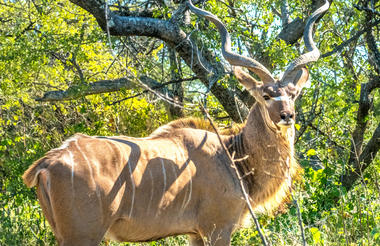Situated just 30 minutes east of Namibia's Windhoek International airport, Zannier Reserve stretches for 900 square kilometres. It is known for its scenic savanna-covered landscapes inhabited by a vast variety of wildlife. Commonly spotted species include: leopard, giraffe, warthog, antelope, ostrich and jackal. It is also home to the Shiloh Wildlife Sanctuary which provides a refuge for injured or abandoned rhinos and elephants. Visitors can look forward to spotting an array of wildlife, soaking up the beautiful views, and enjoying a guided safari to track the animals.



Spreading across Botswana, South Africa and Namibia, the Kalahari meaning 'the great thirst' is an exceptionally beautiful living desert. The landscape is characterised by a large semi-arid sandy savannah draped over a gently rolling inland sea of sand covering most of Botswana and large parts of Namibia and South Africa. It is also the last bastion of the indigenous San people with the modern world having enveloped all the other areas they once roamed. The Namibian portion is made up of red sands covered in thin, wispy, mostly golden grass and dotted with acacia trees and wide-ranging wildlife including gemsbok, impala, jackals and cheetah.


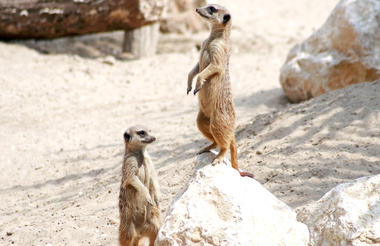
Carving out an epic rocky wonderland in the south of Namibia, the Fish River has created Africa’s largest and the world’s second-largest canyon. Hot, dry and stony, the Fish River Canyon measures a whopping 160 kilometres in length, at times 27 kilometres in width and 550 metres in depth. The awe-inspiring natural beauty of this ancient geological marvel draws visitors from around the globe. For those looking for adventure, the intense 85 kilometre Fish River Hiking Trail through1.5 billion years of geological history will definitely thrill avid adventure enthusiasts, and for visitors looking to relax, head over to the canyon's southern end to enjoy a soak in the mineral waters of the renowned hot springs of Ai-Ais, or take in the spectacularly scenic views from Hobas Restcamp as well as numerous other viewpoints along its rim. Other popular activities include: scenic chartered flights, horse riding, nature drives and seasonal kayaking.



As previously described



Perched above the plains of the Namib Desert in the rocky Aus Mountains, the small village of Aus lies at the heart of phenomenal botanic diversity. Aus serves as an excellent base from which to see the area’s major attraction: the feral horses of the Namib Desert, which run wild and free in the sparsely vegetated plains. The best place for viewings is at the water trough at Garub, which lies just twenty kilometres away from Aus. Visitors can gain insight into the Succulent Karoo by visiting beautiful Gondwana Sperrgebiet Rand Park, home to the most biodiverse desert in the world. Don't miss the opportunity to camp under the famously clear Namibian night sky and experience the desert landscape on horseback.



The 24 000-hectare Namib Tsaris Conservancy is tucked between the Namib and Tsaris mountains. The conservancy is only thirty minutes’ drive from the Sesriem gate which provides access into the Sossusvlei Dunes and acts as a gateway to the Great Namib Sand Sea, now declared a World Heritage Site. The Namib Tsaris Conservancy is a scenic ecological sanctuary featuring a picturesque landscape of vast gravel plains, mountainous areas, and dry river valleys, as well as a vast raised plateau which towers above the desert below. The conservancy and the surrounding area provides a vital refuge for wildlife through the dry season. This rehabilitated area is home to an array of indigenous wildlife including: oryx, springbok, Hartmann’s mountain zebra, Burchell’s zebra, kudu, hartebeest, giraffe, steenbok, klipspringer, bat-eared fox, as well as predators such as leopard, cheetah and hyena.



Set along Namibia's spectacularly scenic coast, the seaside town of Swakopmund is known for its wide-open avenues, colonial architecture, and its surrounding otherworldly desert terrain. Founded in 1892 as the main harbour for German South-West Africa, Swakopmund is often described as being more German than Germany. Now a seaside resort town, Swakopmund is the capital of the Skeleton Coast tourism area and has plenty to keep visitors happy. The quirky mix of German and Namibian influences, adventure options, laid-back atmosphere and cool sea breeze make it a very popular Namibian destination. Visitors can look forward to a number of exciting activities including: quad biking, horse riding, paragliding, fishing, sightseeing and fascinating desert tours.

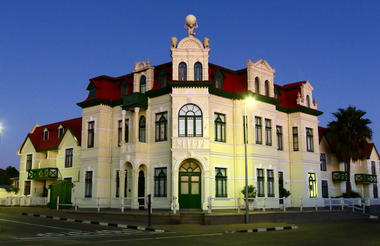
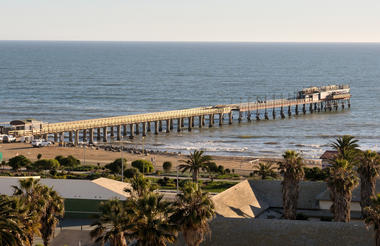
As previously described



Conveniently located only a few hour’s drive from Namibia’s capital city of Windhoek, the Erongo Mountain Range stretches across the plains between the towns of Omaruru and Karibib, and is home to a remarkably rich natural heritage. This expanse of rugged wilderness serves as one of Namibia’s most popular tourist drawcards, attracting visitors with its spectacularly scenic landscapes, magnificent caves and rock painting sites, and its impressive array of wildlife species. These include, among others: rhino, elephant, cheetah, leopard, giraffe, wildebeest, impala, blesbok, waterbuck, kudu, warthog, mountain zebra, oryx, eland, springbok and over 200 species of bird. Visitors can look forward to enjoying a variety of adventurous activities such as hiking, rock climbing, games drives, horse riding safaris and mountain biking.



Set in the Kunene Region of northwestern Namibia, Twyfelfontein is a spectacularly scenic area, featuring one of the largest and most important concentrations of rock art in Africa. The name ‘Twyfelfontein’ translates to ‘Fountain of Doubt’, which refers to the perennial spring situated in the impressive Huab Valley flanked by the slopes of a sandstone table mountain. It was this spring that attracted Stone Age hunters over six thousand years ago, and it was during this time that the extensive group of rock engravings and paintings were produced. Visitors can look forward to basing themselves at some wonderfully shady campsites along the Aba-Huab riverbed, while exploring over thirty different sacred ritual sites of the traditional hunter-gatherer communities.



As previously described



Sharing the southern boundary with Etosha National Park, the prolific 30 000-hectare private Ongava Game Reserve is considered one of the top private game reserves in the region, enjoying global recognition for exceptional conservation, groundbreaking research and exciting safari experiences. The landscape is characterised by vast open plains dotted with salt plans and abundant wildlife. Visitors can easily access Etosha through Andersson’s Gate in the south.
Known for its luxury lodges made out of natural materials, Ogava is a popular destination for those looking to immerse themselves in nature. The reserve offers visitors the perfect combination of wildlife safari experiences within and around the Etosha National Park. One of Ongava’s top attractions is its rhino population and guests can experience the thrill of getting close to these majestic creatures. Popular activities include: night game drives, guided nature walks, bird watching and 4x4 guided game drives.

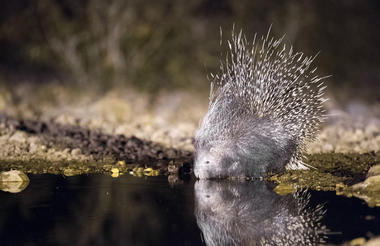
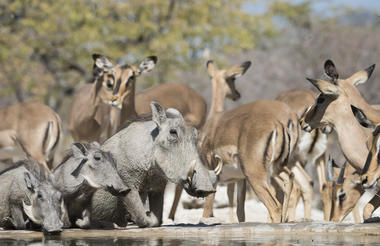
Situated east of Etosha, bordering Fisher's Pan, Onguma Game Reserve is one of Namibia's best-kept secrets. The reserve offers visitors the opportunity to experience Africa in all her beauty and diversity. Onguma Game Reserve features over 34000 hectares of protected land scattered with a variety of wildlife including plains game, black rhino, kudu, giraffe, zebra, lion, cheetah, leopard and more than 300 bird species. The seasonal rains attract thousands of migrating birds to the Fisher’s Pan wetland area. The neighbouring Etosha National Park is home to a rich array of wildlife, including four of the Big 5. Visitors can enjoy game drives, guided walks and rhino research drives within the private reserve as well as wildlife safaris into Etosha National Park to view abundant game in the largest national park in Namibia.



Midway between the spectacular Etosha National Park and the capital city of Windhoek, lies the well-known Okonjima Nature Reserve. The 22 000 hectare nature reserve is home to AfriCAT, a carnivore sanctuary, which gives the captive cats a second chance to be released back into the wild and become completely independent hunters in a protected area right in the middle of commercial cattle farmland. Visitors can enjoy a stay at a variety of excellent accommodation options including everything from luxury villas to secluded camping. Don't miss the opportunity to enjoy thrilling cat-tracking guided safaris, leopard-spotting, off-road night drives and learn about local San culture along the Bushmen trail.
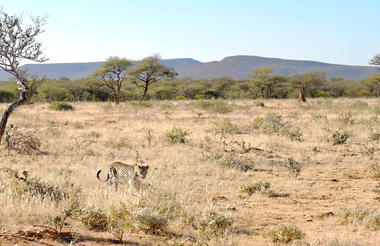

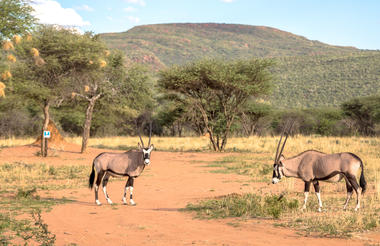
Windhoek, the capital of Namibia, lies at the heart of the country, encircled by magnificent mountains, expansive valleys, and fertile farmlands. The landscape of the Greater Windhoek area surrounding this bustling city is characterised by vast valleys, thick scrub, rocky hills, and covered in golden savannah. Visitors can explore the dry river beds and mountainous scrublands, as well as enjoy birding, leopard-spotting and view large quantities of wildlife in the north; visit the more arid eastern part with its olive, potato, and date plantations; explore the rolling hills of the Khomas Hochland Mountains in the west of the Greater Windhoek area and soak up the epic views along a number of scenic passes leading off the high plateau, including Bosua Pass, Gamsberg Pass, and Spreetshoogte Pass.
